Twentieth Sunday in
Ordinary Time
August 17, 2025 Cycle C
Green priestly vestments symbolize hope and the
vitality of the life of
faith.
Home Page
Liturgical Year Cycle C 2024-2025
Introductory Acts Of Worship
The Entrance Prayers: On Sunday, usually a hymn praising God is sung in
place of reciting a
Psalm from the Bible which invites us to enter more deeply
into the mystery of
God's love for us. The recited weekday Psalm
expresses a youthful heart
and spirit, delighted that we may come before the living
God.
Entrance Song / Entrance Psalm (Antiphon)
Psalm 84:10-11
Turn your eyes, O God, our shield; and look on the face
of your anointed
one; one day within your courts is better than a thousand
elsewhere.
The Priest Approaches and Kisses the Altar:
The
altar is a symbol
of Christ. In it are cut five crosses to recall the
five wounds of
Christ. The altar also represents the Church and has
embedded in it the
relics of her saints. The priest comes to the altar
to celebrate the
Sacrifice in the Church's name. Because of the glory
surrounding the
altar upon which the divine Sacrifice will be made, the
kiss of the priest
unites the Church to Christ, its Redeemer.
Priest: In the name of the Father, and of the
Son, and of the
Holy Spirit.
All:
Amen.
Priest: Grace to you and peace from God our
Father and the Lord
Jesus Christ.
All: And with your spirit.
The Penitential Prayers: We
recognize our
guilt for past sins, express our sorrow for them, and ask
that Mary, the
angels, the saints, and our brothers and sisters in Christ
pray for the Lord
God's mercy. (The priest may select from several
forms).
Priest: Brothers and Sisters, let us
acknowledge our sins, and
so prepare ourselves to celebrate the sacred mysteries.
Priest: Have mercy on us, O Lord.
All: For we have sinned against you.
Priest: Show us, O Lord, your mercy.
All: And grant us your salvation.
The Absolution:
Priest: May almighty God have mercy on us,
forgive us our sins,
and bring us to everlasting life.
All:
Amen.
The Gloria: The Glory of God prayers have existed from the second
century. They
repeat the angels praise of God which heralded the birth
of Christ on
earth. Our praise is lifted again through the years
as we rejoice at His
coming as Lord, God, the most high Jesus Christ, who at
Christmas took on our
human nature while at the same time being the son of Man.
This ancient hymn
expresses our recognition of God's glory and love.
It calls upon Christ
as our holy and divine mediator, and the Holy Spirit who
forever binds us
together in God's love.
Priest and All: Glory to God in the
highest, and peace
to his people on earth. Lord God, heavenly King,
almighty God and Father,
we worship you, we give you thanks, we praise you for your
glory. Lord
Jesus Christ, only Son of the Father, Lord God, Lamb of God,
you take away the
sins of the world: have mercy on us; you are seated at the
right hand of the
Father: receive our prayer. For you alone are the Holy
One, you alone are
the Lord, you alone are the Most High, Jesus Christ, with the
Holy Spirit, in
the glory of God the Father. Amen.
The Collect:
The
priest lifts the
united prayers and petitions of the congregation to God
the Father through the
merits of Jesus Christ in the Holy Spirit.
Priest: Let us pray.
Priest: O God, who have prepared for those who
love you good things
which no eye can see; fill our hearts, we pray, with the
warmth of your love,
so that, loving you in all things and above all things, we may
attain your
promises, which surpass every human desire. Through our
Lord Jesus
Christ, your Son,
who lives and
reigns with you in the
unity of the Holy Spirit, one God, for ever and ever
Liturgy of the Word
Christ
is made known
to us through the Old Testament which prepares us to
recognize Him. In
those days, God inspired men who spoke His message.
Now, the New
Testament Gospel reading announces His presence to us
directly through His
Son. Both readings bring God's message to us.
Our responsibility is
to respond.
The First Reading: From
the Old
Testament.
Jeremiah 38:4-6, 8-10
In those days, the princes said to the king:” Jeremiah
ought to be put to
death; he is demoralizing the soldiers who are left in this
city, and all the
people, by speaking such things to them; he is not interested
in the welfare of
our people, but in their ruin.” King Zedekiah answered:
“He is in your
power” for the king could do nothing with them. And so
they took Jeremiah
and threw him into the cistern of Prince Malachiah, which was
in the quarters
of the guard, letting him down with ropes. There was no
water in the
cistern, only mud, and Jeremiah sank into the mud.
Ebed-Melech, a court official, went there from the palace
and said to him:
“My lord king, these men have been at fault in all they have
done to the
prophet Jeremiah, casting him into the cistern. He will
die of famine on
the spot, for there is no more food in the city.” Then
the king ordered
Ebed-Melech the Cushite to take three men along with him, and
draw the prophet
Jeremiah out of the cistern before he should die.
Priest/Reader: The Word of the Lord.
All:
Thanks
be to God.
The Responsorial Psalm: This Psalm is a prayer to God, or recommends the
practice of virtue.
It is sung as an interlude between the scriptural
readings. It provides
yet another instructional setting and invites the assembly
to imitate the
cantor, who sings a repeated response to the verses of an
ancient Psalm, many
of which are attributed to King David. The verses
are sung first by a
cantor (song leader) accompanied by instruments, the
refrain is sung by the
people.
Responsorial
Psalm 40:2, 3, 4, 18
Cantor: Lord, come to my aid; come to my aid!
All: Lord, come to my aid; come to my aid!
Cantor: I have waited, waited for the Lord, and he
stooped toward me.
All: Lord, come to my aid; come to my aid!
Cantor: The Lord heard my cry. He drew me
out of the pit of
destruction, out of the mud of the swamp; he set my feet upon
a crag he made
firm my steps.
All: Lord,
come to my aid;
come to my aid!
Cantor: And he put a new song into my mouth, a
hymn to our God.
Many shall look on in awe and trust in the Lord.
All: Lord,
come to my aid;
come to my aid!
Cantor: Though I am afflicted and
poor, yet the Lord
thinks of me. You are my help and my deliverer; O my
God, hold not back!
All: Lord, come to my aid; come to my aid!
The Second Reading: Taken from the
New Testament.
Hebrews 12:1-4
Brothers and sisters: Since we are surrounded by so great
a cloud of
witnesses, let us rid ourselves of every burden and sin that
clings to us and
persevere in running the race that lies before us while
keeping our eyes fixed
on Jesus, the leader and perfector of faith. For the
sake of the joy that
lay before him he endured the cross, despising its shame, and
has taken his
seat at the right of the throne of God. Consider how he
endured such
opposition from sinners, in order that you may not grow weary
and lose
heart. In your struggle against sin you have not yet
resisted to the
point of shedding blood.
The Alleluia: An ancient expression of joy anticipating the Lord's
message we will hear
in the Gospel.
John 10:27
Cantor: Alleluia!
Alleluia!
Alleluia!
All: R/.
Alleluia!
Alleluia! Alleluia!
Cantor: My sheep hear my voice,
says the Lord; I
know them, and they follow me.
All: R/. Alleluia!
Alleluia!
Alleluia!
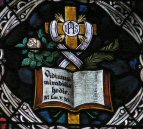 The Gospel: The
Liturgy of the
Word is completed by the reading of the Gospel.
Before its reading, the
members of the assembly trace the sign of the cross upon
the forehead to
indicate their mental acceptance of the Truth, on the lips
to indicate their
readiness to announce it, and over the heart to indicate
their sincere desire
to accept it into their lives. The "Good News" of
the Gospel
tells that God's kingdom has come for all to hear, accept,
and announce to the
world for its salvation. It is God who is speaking
to us. Christ
comes to teach us by the example of His life and by His
own words.
The Gospel: The
Liturgy of the
Word is completed by the reading of the Gospel.
Before its reading, the
members of the assembly trace the sign of the cross upon
the forehead to
indicate their mental acceptance of the Truth, on the lips
to indicate their
readiness to announce it, and over the heart to indicate
their sincere desire
to accept it into their lives. The "Good News" of
the Gospel
tells that God's kingdom has come for all to hear, accept,
and announce to the
world for its salvation. It is God who is speaking
to us. Christ
comes to teach us by the example of His life and by His
own words.
The Gospel Luke
12:49-53
Written to explain that
Christ came to save everyone.

Priest: The Gospel of the Lord.
All: Praise
to you, Lord
Jesus Christ.
The Priest's Sermon: The
priest develops,
explains, and comments upon the Master's words, so our
minds may be
enlightened, and our hearts enriched.
(A
priestly
reflection upon this Gospel)
Profession of Faith: We
state in the
Nicene Creed the principles of our faith in precise and
definite terms.
All: I believe in one God,
the Father, the
Almighty, maker of heaven and earth, of all that is seen and
unseen. I
believe in one Lord, Jesus Christ, the Only Begotten Son of
God, born of the
Father before all ages. God from God, Light from Light,
true God from
true God, begotten, not made, consubstantial with the Father;
through him all
things were made. For us men and for our salvation he
came down from
heaven, and by the Holy Spirit was incarnate of the Virgin
Mary and became
man. For our sake he was crucified under Pontius Pilate,
he suffered
death and was buried and rose again on the third day in
accordance with the
Scriptures. He ascended into heaven and is seated at the
right hand of
the Father. He will come again in glory to judge the
living and the dead,
and his kingdom will have no end. I believe in the Holy
Spirit, the Lord,
the giver of life, who proceeds from the Father and the Son,
who with the
Father and the Son is adored and glorified, who has spoken
through the
prophets. I believe in one, holy, catholic and apostolic
Church. I
confess one Baptism for the forgiveness of sins, and I look
for the
resurrection of the dead and the life of the world to
come. Amen.
General Intercessions: We
pray for the needs
of the pope, civic leaders, our own needs, those of
others, the sick, the
dying, those who have died, the church, and the
world. The response of
all to each intercession: Lord, hear our prayer.
All: Lord,
hear our
prayer.
The Liturgy of the Eucharist
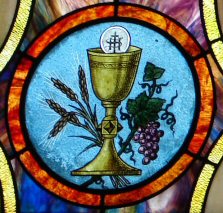 Gifts
of bread and
wine symbolizing ourselves are presented to the priest who
will offer them to
God the Father. Through the Holy Spirit, they will
become the Body and
Blood of Jesus Christ whom we receive in Holy
Communion. Jesus unites
Himself with us for our spiritual nourishment and
strength. Today, when
individuals do not present their own personal offerings of
bread and wine, the
monetary contribution symbolizes the material of their
united sacrifice.
The priest makes and offering of the bread and wine to
God.
Gifts
of bread and
wine symbolizing ourselves are presented to the priest who
will offer them to
God the Father. Through the Holy Spirit, they will
become the Body and
Blood of Jesus Christ whom we receive in Holy
Communion. Jesus unites
Himself with us for our spiritual nourishment and
strength. Today, when
individuals do not present their own personal offerings of
bread and wine, the
monetary contribution symbolizes the material of their
united sacrifice.
The priest makes and offering of the bread and wine to
God.
Preparation of the Bread and Wine:
Priest: Blessed are you, Lord
God of all
creation, for through your goodness we have received the bread
we offer you:
fruit of the earth and work of human hands, it will become for
us the bread of
life.
All: Blessed
be God for
ever.
Priest: By the
mystery of
this water and wine may we come to share in the divinity of
Christ, who humbled
himself to share in our humanity.
Priest: Blessed are you, Lord God of all
creation, for through
your goodness we have received the wine we offer you; fruit of
the vine and
work of human hands it will become our spiritual drink.
All: Blessed
be God for
ever.
Priest: With
humble spirit
and contrite heart may we be accepted by you, O Lord, and may
our sacrifice in
your sight this day be pleasing to you, Lord God.
The Priest's Hands are Washed: This
act was
traditionally necessary because the priest handled the
various gifts presented
by the people. Now, the cleansing act using water
reminds the priest and
ourselves of the need to cleanse not only the hands but
the soul. Soon,
the priest's hands will hold the actual body of Christ,
and we will become His
dwelling place.
Priest: Wash me O Lord, from m
iniquity and
cleanse me from my sin.
Pray, brethren, that my sacrifice and yours may be
acceptable to God,
the almighty Father.
All: May
the Lord accept
the sacrifice at your hands for the praise and glory of his
name, for our good
and the good of all his holy Church.
Prayer over the Gifts: Speaking
in our name,
the priest asks the Father to accept the gifts we offer
through him.
Priest: Receive our oblation, O Lord, by which
is brought about
a glorious exchange, that, by offering what you have given, we
may merit to
receive your very self. Through Christ our Lord.
Eucharistic Prayer: (Number Two: The priest may select from several
forms).
Priest: The Lord be with you.
All: And with your
spirit.
Priest: Lift
up your hearts.
All: We
lift them up to
the Lord.
Priest: Let us give thanks to
the Lord, our
God.
All: It is right and just.
Preface Prayer:
It is truly right and just, our duty and our salvation,
always and
everywhere to give you thanks, Lord, holy Father, almighty and
eternal God
through Christ our Lord.
For out of compassion for the waywardness that is ours,
he humbled himself
and was born of the Virgin; by the passion of the Cross, he
freed us from
unending death, and by rising from the dead he gave us life
eternal.
And so, with Angels and Archangels, with thrones and
dominions, and with
all the hosts and Powers of heaven, we sing the hymn of your
glory, as without
end we acclaim:
Acclamation:
Priest and All: Holy,
Holy, Holy
Lord, God of hosts. Heaven and earth are full of your
glory.
Hosanna in the highest. Blessed is he who comes in the
name of the
Lord. Hosanna in the highest.
Priest: You are indeed Holy, O Lord, the
fountain of all
holiness. Make holy, therefore, these gifts, we pray, by
sending down
your Spirit upon them like the dewfall, so that they may
become for us the Body
and Blood of our Lord Jesus Christ.
The priest repeats the words which Christ used at his
Last Supper when He
changed the bread into His Body and the wine into His
Blood. His Body and
Blood are truly present but under the appearance of bread
and wine. The
death of Christ is prolonged in each of those who receive
Him worthily.
We apply His death to ourselves so that we may share His
glory. This
moment is the most solemn on earth because it is Divine
act which enables us to
apply to ourselves the Cross which Christ willingly took
upon Himself.
We are called to die to sin and lift our very selves
to God so that we
become changed; to do as God would have us do, to become
what God would have us
become. Our own little cross can lift us into union
with Christ's Cross
so we may earn the joys of everlasting happiness with God
the Father.
The Lord's Supper: You are indeed Holy, O
Lord, the fount
of all holiness. Make holy, therefore, these gifts, we
pray, by sending
down
 your spirit upon them like the dewfall, so
that they may become for us the
Body and Blood of our Lord Jesus Christ. At the
time he was
betrayed and entered willingly into his Passion, he took bread
and, giving
thanks, broke it, and gave it to his disciples, saying:
your spirit upon them like the dewfall, so
that they may become for us the
Body and Blood of our Lord Jesus Christ. At the
time he was
betrayed and entered willingly into his Passion, he took bread
and, giving
thanks, broke it, and gave it to his disciples, saying:
Take this, all of you, and eat of it, for this is my
Body, which will be
given up for you.
In a similar way, when supper was ended he took the
chalice and, once more
giving thanks, he gave it to his disciples, saying:
 Take this, all of
you, and drink from
it, for this is the chalice of my Blood, the Blood of the
new and eternal
covenant, which will be poured out for you and for many
for the forgiveness of
sins. Do this in memory of me.
Take this, all of
you, and drink from
it, for this is the chalice of my Blood, the Blood of the
new and eternal
covenant, which will be poured out for you and for many
for the forgiveness of
sins. Do this in memory of me.
Memorial Acclamation: (The priest may
select from several
forms).
Priest: The
mystery of faith.
Priest / All: Save us, Savior of the world. For
by your Cross
and Resurrection you have set us free.
Memorial Prayer: (The
priest may
select from several forms).
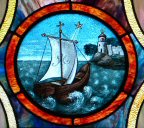 Therefore, as we
celebrate the memorial
of his Death and Resurrection, we offer you, Lord, the Bread
of life and the
Chalice of salvation, giving thanks that you have held us
worthy to be in your
presence and minister to you. Humbly we pray that,
partaking of the Body
and Blood of Christ, we may be gathered into one by the Holy
Sprit.
Therefore, as we
celebrate the memorial
of his Death and Resurrection, we offer you, Lord, the Bread
of life and the
Chalice of salvation, giving thanks that you have held us
worthy to be in your
presence and minister to you. Humbly we pray that,
partaking of the Body
and Blood of Christ, we may be gathered into one by the Holy
Sprit.
Remember, Lord, your Church, spread throughout the world,
and bring her to
the fullness of charity, together with _____ our Pope and
_____ our Bishop and
all the clergy. Remember also our brothers and sisters
who have fallen
asleep in the hope of the resurrection, and all who have died
in your mercy:
welcome them into the light of your face.
Remember also our brothers and sisters who have fallen
asleep in the hope
of the resurrection, and all who have died in your mercy:
welcome them into the
light of your face. Have mercy on us all, we pray, that with
the Blessed Virgin
Mary, Mother of God, with blessed Joseph, her Spouse, with the
blessed
Apostles, and all the Saints who have pleased you throughout
the ages, we may
merit to be coheirs to eternal life, and may praise and
glorify you through
your Son, Jesus Christ.
Doxology:
 Prayer of Praise: Through
him, with
him, and in him, O God, almighty Father, in the unity of the
Holy Spirit, all
glory and honor is yours for ever and ever.
Prayer of Praise: Through
him, with
him, and in him, O God, almighty Father, in the unity of the
Holy Spirit, all
glory and honor is yours for ever and ever.
All: Amen.
Communion Rite
In the Liturgy of the Eucharist, we symbolically
offer ourselves to the
Lord through the gifts of bread and wine. At the
Consecration, we offer
our very lives to be united the God the Father through the
Cross of
Christ. In Communion, we find that we have not died
at all but have come
to life. We have surrendered ourselves to God
through His Divine Son,
Jesus Christ. In return, become ennobled and
enriched.
We give up time and we get eternity, we give up our sin
and we receive grace,
we surrender our self-will and receive the strength of the
Divine Will, we give
up ourselves and we receive everything. For the Son
of God says to us
that unless we receive Him we shall not have Divine life
in us. But it is
not really we who receive Christ as it is Christ who
receives us, bringing us
into Himself.
God makes His Cross the very means of our salvation
and our life.
While we have crucified Him, His eternal love cannot be
extinguished.
Christ willed to give us the very life we crucified in our
Redemption, the
Consecration of Holy Thursday into Communion, His death
into our everlasting
life.
The Lord's Prayer:
Priest: At the Savior's command and formed by divine teaching, we
dare to say:
Priest and All: Our Father, who art in heaven, hallowed
be they name;
Thy kingdom come; Thy will be done on earth as it is in
heaven. Give us
this day our daily bread, and forgive us our trespasses, as we
forgive those
who trespass against us; and lead us not into temptation, but
deliver us from
evil.
Priest: Deliver us, Lord, we pray, from every evil, graciously
grant peace in our
days, that, by the help of your mercy, we may be always free
from sin and safe
from all distress, as we await the blessed hope and the coming
of our Savior,
Jesus Christ.
All: For
the kingdom, the
power and the glory are yours now and forever.
Prayer for Peace:
Priest: Lord Jesus Christ, who said to your Apostles: Peace I
leave you, my peace
I give you, look not on our sins, but on the faith of your
Church, and
graciously grant her peace and unity in accordance with your
will. Who
live and reign for ever and ever.
All: Amen.
Priest: The peace of the Lord be with you always.
All: And with your spirit.
Priest: Let us offer each other the sign of
peace.
Breaking of the Bread:
Priest: May this mingling of the Body and Blood
of our Lord
Jesus Christ bring eternal life to us who receive it.
Priest and All: Lamb of God, you take
away the sins of
the world, have mercy on us.
Lamb of God, you take away the sins of the world, have
mercy on us.
Lamb of God,
you take away the sins of the world, grant us peace.
 Priestly Preparation: May
the receiving of
your Body and Blood, Lord Jesus Christ, not bring me to
judgment and
condemnation, but through your loving mercy be for me
protection in mind and
body and a healing remedy.
Priestly Preparation: May
the receiving of
your Body and Blood, Lord Jesus Christ, not bring me to
judgment and
condemnation, but through your loving mercy be for me
protection in mind and
body and a healing remedy.
Priest: Behold
the Lamb of
God, behold him who takes away the sins of the world.
Blessed are those
called to the supper of the Lamb.
Priest and All: Lord, I am not worthy that you should
enter under my
roof, but only say the world and my soul shall be healed.
Priest: May the Body of Christ keep me safe for
eternal life.
May
the
Blood of Christ keep me safe for eternal
life.
Communion Antiphon:
Psalm 130:7
With the Lord there is mercy; in him is plentiful
redemption.
Communion of the Faithful:
Priest: The Body of Christ.
The Faithful: Amen.

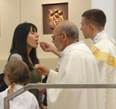
Priest/Deacon/
Extraordinary Eucharistic Minister: The Blood of Christ.
 The
Faithful: Amen.
The
Faithful: Amen.
Cleansing of the Vessels:
Priest: What has passed our lips as food, O
Lord, may we possess
in purity of heart, that what has been given to us in time may
be our healing
for eternity.
Prayer after Communion:
Priest: Let us
pray.
Priest: Made partakers of Christ through these
Sacraments, we
humbly implore your mercy, Lord, that, conformed to his image
on earth, we may
merit also to be his coheirs in heaven. Who lives and
reigns for ever and
ever.
Concluding Rite
Greeting:
Priest: The Lord be with you.
All: And
with your
spirit.
Priest: Bow
down for the
blessing.
Final Blessing:
Priest: May God bless you with every heavenly blessing,
make you always
holy and pure in his sight, and teach you with the words of
truth; may he
instruct you in the Gospel of salvation, and ever endow you
with fraternal
charity. Through Christ our Lord.
All: Amen.
Dismissal Prayer:
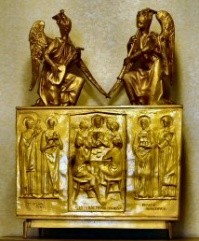 O my
Jesus, forgive us
our sins.
O my
Jesus, forgive us
our sins.